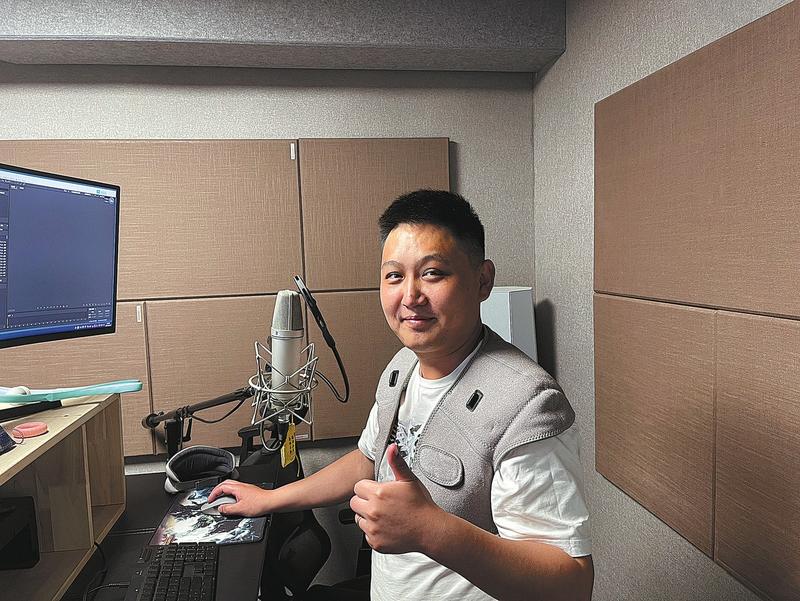An ex-pharmacy worker is now a leading internet storyteller. Cao Yin reports.
 Online storytellers undertake a training session on vocal techniques in Shanghai. (PHOTO PROVIDED TO CHINA DAILY)
Online storytellers undertake a training session on vocal techniques in Shanghai. (PHOTO PROVIDED TO CHINA DAILY)
Sha Wei used to run a village drugstore in East China. When business was slow, he could sometimes go days without talking to anyone.
Today, as a popular online audio storyteller, his broadcasts are heard by more than 6.5 million listeners.
His deep, dulcet and modulated tones have helped him amass a legion of fans, who tune in to storytelling apps to hear him narrate tales of fantasy, horror and suspense.
The change began one day in 2013 after Sha, from Heze, Shandong province, finished a casual chat with a friend he had met through an online game.
The conversation resulted in Sha volunteering to read and record stories for the acquaintance.
"He told me he liked listening to stories, but he couldn't find anyone to read them to him. I was available at the time and was also interested in doing it," said the 35-year-old, whose formal education ended when he graduated from high school.
"I never thought a decision I made just for fun could take me on such a journey."
 Online narrator Sha Wei poses for a photo at his workshop in Shandong province. (PHOTO PROVIDED TO CHINA DAILY)
Online narrator Sha Wei poses for a photo at his workshop in Shandong province. (PHOTO PROVIDED TO CHINA DAILY)
Midnight transformation
Following the chat, Sha paid about 300 yuan (US$46) for a microphone and a sound card for his PC, and started a new life of selling medicines by day and recording books at night.
At 9 pm every day, when the pharmacy closed, he sat down at the microphone, opened a novel and pressed the "record" button. Then he became the characters in the book, playing all the roles by varying his vocal delivery. When he finished each section, he sent the audio file he had recorded to his friend.
He recalled that it wasn't easy for someone without broadcast training to assume a range of voices and express the different personalities of the characters, but he kept trying and enjoyed the experience.
"I was delighted when my friend told me I had done a good job. What made me even happier was when I found that someone else had listened to my audio files after I uploaded them online," he said, adding that the discovery cheered him up, fed his ego and brought him a sense of achievement.
He practiced Putonghua (standard Mandarin) to tone down his Shandong accent and ensure correct pronunciation, and he also spent a lot of time reading and studying the novel he was narrating at the time.
His "homework" brought each character to life and gave his listeners more joy in his work.
Sometimes, he even devised several ways to play out a scene in a book and recorded them repeatedly.
"I wanted to select the best version for my listeners," he said, adding that an audio file lasting three or four hours often took seven or eight hours to prepare and record.
Sometimes his interpretations were a little too realistic. He recalled how one night when he had finished recording a horror story, he was scared to go to the bathroom after listening to a playback of the work.
 People sample audiobooks through headphones at a fair in Shanghai. (XING YUN / FOR CHINA DAILY)
People sample audiobooks through headphones at a fair in Shanghai. (XING YUN / FOR CHINA DAILY)
Opportunity knocks
When he had recorded almost 100 episodes of the novel series he was recording for his friend, Sha learned that a website was looking for someone to make audiobooks and would pay 15 yuan an hour.
He decided to give it a go. "Compared with the drugstore business and my unstable income, the storytelling experience was something I enjoyed, and the payment sounded OK," he said.
He quit the pharmacy and began recording audiobooks at home as Toutuoyuan Storytelling.
"It was like gambling. I wasn't sure whether the new business had potential, and I often asked myself, 'What do you really want to be?'" he said.
Though he was concentrating on his new passion, Sha also spent time looking for other jobs from 2014 to 2016 as payment was slow. For example, the first few chapters of each book were offered to listeners for free, but they had to pay if they wanted to hear more.
Now, though, his fee varies depending on the popularity of the book in question.
He was not optimistic about the future of storytelling until 2017, when a successful voice test with Ximalaya FM, one of China's biggest online audio-sharing platforms, gave him the opportunity to record a popular online fantasy novel.
Before, Sha had recorded books on his own, which meant he had to represent female characters by mimicking women's voices.
This time, though, he was only responsible for the male roles, while the female characters were handled by a woman the platform employed as an audio storyteller.
They spent about a year developing and recording the voice of each character.
"We wanted to make a high-quality audio work that would be accepted by original readers of the novel and also attract other netizens," Sha said.
The hard work paid off. The audiobook received abundant thumbs-ups after it was put online. It quickly received more than 1.53 billion plays and was awarded 9.4 of 10 on the platform's audiobook ranking.
The success quickly brought Sha a huge number of fans, which made him well-known among authors of online literature and also helped raise his income. While he preferred not to disclose his earnings, he conceded that the sum is much higher than the 3,000 yuan he made at the drugstore every month.
As audiobooks became more popular, Sha saw more people rushing into the sector, both recording books and listening to stories.
"The phenomenon and the increasingly higher demand for audiobooks allowed me to see the market prospects and helped me realize that being a storyteller or an audiostreaming host could be developed as a career," he said.
Radio plays
However, even while he continued to record books, he was thinking about new ways to tell the stories more vividly, so he decided to try a fresh approach.
This year, Sha made his debut as a voice director, leading a team of more than 40 narrators to record a popular martial arts fantasy online novel in which a police officer finds himself transported to ancient times after falling asleep while drunk.
To allow listeners greater scope to imagine the scenes, he chose the narrators from his team whose voices he felt suited the characters best.
He decided not to voice any characters himself. Instead, he shared tips on vocal delivery with the team members to help them express emotions such as fear, gratitude or hope, in line with the characters' thoughts in different scenes.
One factor in his decision was that his voice was becoming tired and worn out after spending so many hours reading aloud in recent years.
He said his new approach fits a growing trend in the industry in which audiobooks are beginning to sound more like radio plays.
Three months after the audiobook was uploaded, it had been heard more than 100 million times.
Now, Sha has swapped his basic studio for a professional recording facility, while his equipment, such as sound cards and microphones, has also been upgraded.
However, he said one thing will never change: his desire to make top-quality audiobooks for his listeners.
Contact the writer at caoyin@chinadaily.com.cn


